Pure and unrefined coconut oil is a completely natural and organic product that can benefit your overall health, help you beautify yourself, and turn the dishes you prepare into a complete and healthy food. Coconut oil, along with cocoa butter and olive oil, is considered one of the healthy fats. It is important not to confuse coconut oil with palm oil or vegetable oil.
As you may have guessed, coconut oil is obtained from coconuts. The most valuable and healthy is the unrefined oil, which is obtained by cold pressing the already dried coconut. The structure of coconut oil is solid up to 25°C. At temperatures below 25°C, coconut oil is in a solid state, but then it begins to melt. That is why, when applied to the skin, it immediately melts and is fully absorbed after a short time.
Coconut oil is white to pale yellow in color and has no particular or strong odor, only a light and pleasant scent. However, coconut oil has recently been rehabilitated from its given label of unhealthy fat. Some time ago, scientists claimed that coconut shell oil is unhealthy because of the saturated fats it contains. However, experts have completely refuted this fact.
Currently, the Philippine Islands are the largest exporter of this healthy fat worldwide. The oil is also extracted along the coasts of India and in Sri Lanka, Malaysia. The market for coconut oil is large because it is also used for culinary, medicinal and cosmetic purposes. In Thailand, massage therapy with coconut oil is the mainstay of the so-called oriental massage.
An important property of coconut oil is that it does not oxidize during baking and frying, unlike most fats, which are made up of long-chain saturated fatty acids. Coconut oil is made up mainly of medium-chain fatty acids. It is known that long-chain fatty acids lead to an increase in bad cholesterol (LDL) in the body, which in turn increases the risk of cardiovascular disease. However, medium-chain fatty acids are converted into good cholesterol (HDL).

Composition of coconut oil
Coconut oil consists of 90% crude saturated fat, which is in the form of medium-chain fatty acids, as we have already mentioned. These fats keep the immune system strong, have a good effect on the thyroid gland, skin and provide quick energy. Coconut oil is a record holder for the content of lauric acid, which is not found in any other oil in such large quantities. It is logical that coconut oil is a powerful antioxidant that rejuvenates the body and reduces the need for vitamin E.
The composition of coconut oil contains between 86.5 - 90% saturated fatty acids, 5-6% polyunsaturated fatty acids, 1.5- 2% monounsaturated fatty acids. 45% of its composition is lauric acid, 17% - myristic acid, 8% - palmitic acid, 8% - caprylic acid, 7% - caproic acid and 5% - stearic acid.
100 g of coconut oil contains: 862 kcal; 100 g of fat; 0 g of carbohydrates; 0 g protein
Quality and healthy coconut oil should be unrefined, cold-pressed, without dyes and should not contain hydrogenated fats and hexane.
Types of coconut oil
There are mainly 4 varieties of coconut oil:
- Natural, unrefined coconut oil, which is extracted from fresh coconuts;
- Refined coconut oil, in which the copra (dried coconut interior) is refined, decolorized and deodorized;
- Hydrogenated coconut oil, which has an increased melting point due to the process. However, saturated fats increase in it, which increases the risk of the formation of harmful trans fats;
- Fractionated coconut oil, which is a part of coconut oil from which the residual long-chain fatty acids are separated, which in turn makes it even healthier. This process also produces caprylic and caproic fatty acids. It is more resistant to heat treatment and can be used for frying and baking.
Choosing and storing coconut oil
As a rule, it is considered that the best quality coconut oil comes from the Philippines and has an “A” quality standard. Unrefined coconut oil is best for cooking or baking, while fractionated is suitable for frying. Hydrogenated coconut oils should definitely be avoided because they are not a healthy product, like all other hydrogenated fats.
When buying coconut oil, be sure to read the label to see exactly what it contains or whether it is marked as a pure and organic product. Always choose organic and non-hydrogenated. It is best to store coconut oil in a cool place and tightly closed, as its shelf life is up to 2 years. Store the oil at a temperature of up to 25°C.

Cooking with coconut oil
Coconut oil has long been known as a culinary ingredient in the tropics. In most countries in this area, it is an indispensable part of traditional cuisine, but much later its popularity spread to Europe.
However, it should be clear that coconut oil should be consumed in moderate quantities, because in larger quantities it is unhealthy. You can take up to 2-3 tablespoons of coconut oil per day, as an ingredient in dishes, drinks or on its own. Coconut oil is an excellent complement to cocoa butter and all cocoa products and is widely used in confectionery and the production of chocolate desserts.
Coconut oil is a healthy alternative to butter, as well as olive oil and any other type of fat used for cooking. It allows heating up to 180°C and hardly forms trans fats. This type of fat is also popular in the increasingly popular vegetarian cuisine, where it is included in various coconut pastries, Raffaello candies, coconut cake, chocolate truffles, coconut cookies and biscuits. Coconut oil is also used to prepare very pleasant fruit and milk shakes. Of course, you can also prepare various savory dishes with coconut oil - with chicken, pork, duck, lamb, veal, as well as vegetable specialties.

Benefits of coconut oil
Coconut oil has the fame of being an assistant in preserving youth and beauty, but it also has many healing properties on human health. If you take coconut oil prophylactically, it will improve your digestion and increase metabolism, which in turn can even lead to weight loss, as well as overall strengthening of the body.
Coconut oil helps with hypoglycemia, but it also has antiviral and antifungal properties. Scientists claim that coconut oil, treated with special digestive enzymes, prevents the multiplication of caries bacteria. The oil is a killer for invisible to the human eye pests - the bacteria Streptococcus mutans, which protects teeth from destruction.
Healthy coconut fat also controls cholesterol levels in the body, increasing good and reducing bad cholesterol. This automatically reduces the risk of cardiovascular diseases dramatically. There is evidence that some fatty acids in coconut oil kill Candida bacteria and help with candidiasis. And in addition to aiding good digestion, the beneficial fats in coconut oil with their antibacterial properties help control parasites and fungi that cause an upset stomach and digestive problems, such as irritable bowel syndrome.
At the same time, these fats help us to better absorb vitamins, minerals and amino acids. Coconut oil also has a good effect on the function of the thyroid gland. With all these beneficial properties, it is not out of the question that you can also lose some weight while consuming coconut oil, in which your muscle mass will not budge. The miracle oil is ideal for massages, because it has the ability to slightly cool the body, relieve joint pain, relax muscles and nerves.
You can treat abrasions and wounds with coconut oil, which will form a thin filter on them, preventing dust and various bacteria and viruses from entering. The injured area will heal much faster if you treat it with coconut oil.
Beautification with coconut oil
Did you know that for centuries, coconut oil has been used by people not only as a food product, but also to maintain their beauty and youth for a longer time. This gift from nature is suitable for skin and hair care. And if you have any concerns about this, we must note that coconut oil is absorbed very easily and does not leave annoying greasy marks.
At the same time, your skin remains fully hydrated, because the oil retains its moisture. Applied to the hair, the oil makes it extremely soft and pleasant to the touch. That is why you can include coconut oil in the homemade hair masks that you prepare. You can make the mask with 1 tbsp. coconut oil, 1 egg yolk and a little alcohol. The mixture is applied evenly to the hair and after you have left the mask on, you wash it off with a mild shampoo.
If you want to get a nice tan, forget about expensive sunscreen milks and oils, which are of questionable composition anyway. And in this case, coconut oil can be useful to you. To get an even and saturated tan, apply coconut oil. This natural fat moisturizes the skin and retains moisture for a long time, but at the same time allows the sun to penetrate deeply and you get a nice and even tan for a longer time.
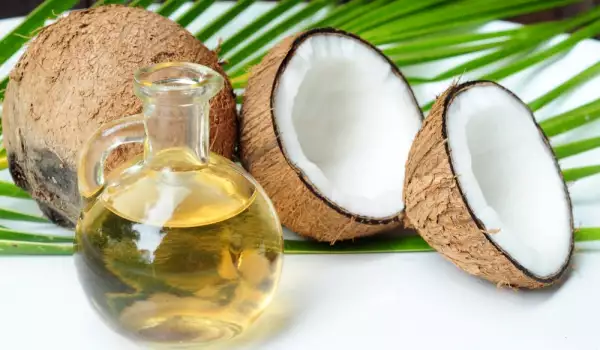
And as a bonus, you can say goodbye to the unpleasant peeling of the skin after a burn. Coconut oil has the ability to naturally protect your epidermis from the harmful effects of strong sunlight. It is harmless to even combine it with sunscreens or even use it as a substitute for any face creams. Both in summer and winter, coconut oil will help you protect your skin from atmospheric influences.
It has been proven that coconut oil is a faithful assistant in the fight against wrinkles. If you regularly apply it, it will help to easily restore the places where the first wrinkles have already appeared. At the same time, your skin will be hydrated, protected and will have a truly healthy appearance. Coconut oil, along with cocoa butter and ostrich oil, are probably the strongest remedies against terrible and disfiguring stretch marks.
Applying coconut oil to clean skin in problem areas will help you permanently get rid of cracks in the skin. Coconut oil is literally a must-have product for pregnant women, as their skin undergoes changes while their belly grows or they gain more weight, which is normal for any expectant mother who carries a child in her belly.
Coconut oil can protect you from cracked hands and cracked heels. You can rub it with light massage movements anywhere on your body – on your face, neck, chest, stomach, love handles, buttocks, thighs, calves, heels and feet. You can use coconut oil as a teeth whitener and toothpaste, hair conditioner, makeup remover, lip balm and as a massage lotion.
Find out how to cook with coconut oil, how to make homemade coconut oil and coconut cream for your homemade specialties.
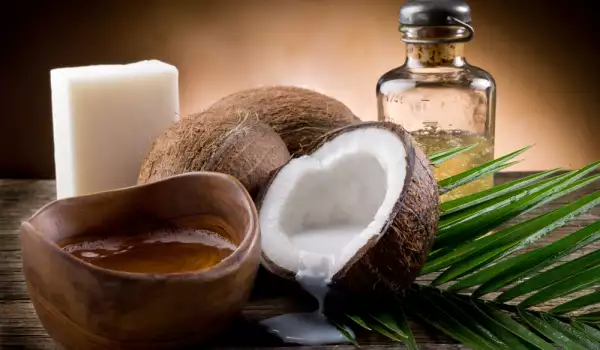
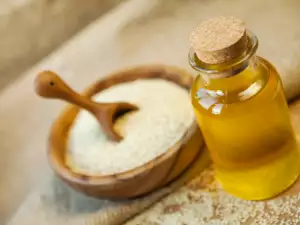

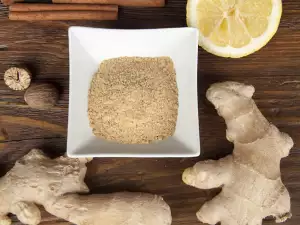
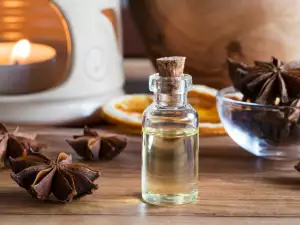





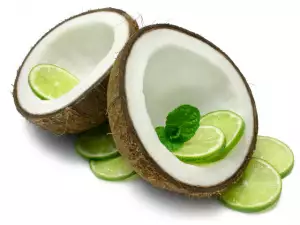
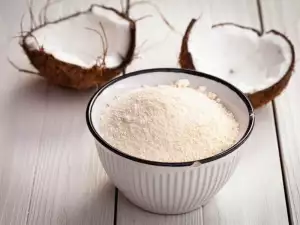

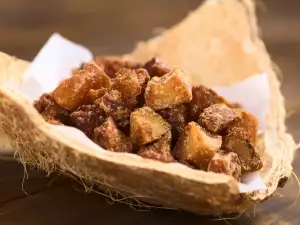






Comments